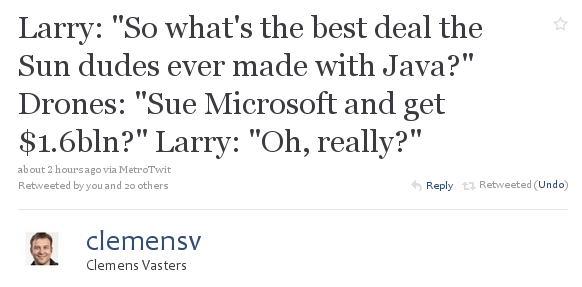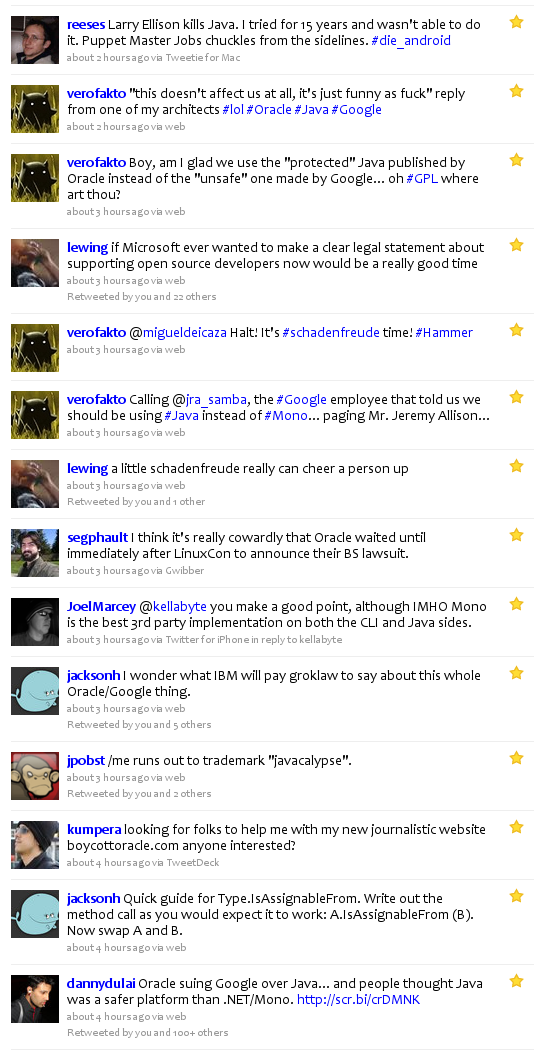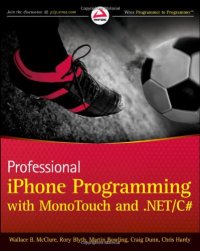Bringing Smiles to the Faces of MacOS developers
 As part of our efforts to bring a superb developer
experience to every platform in the world, we have made a new
release of our bindings to the MacOS X
APIs: MonoMac.
As part of our efforts to bring a superb developer
experience to every platform in the world, we have made a new
release of our bindings to the MacOS X
APIs: MonoMac.
We know that Mac users like to have a smooth installation experience, and we have worked hard to make this as simple as possible. Currently MonoMac is still not a 1.0 product, this is what developers need to do:
- Install Mono for OSX.
- Install MonoDevelop.
- Add the MonoMac repository to MonoDevelop.
- Create a MonoMac project.
The result is a .app that you can distribute to your users.
The MonoMac API design is inspired by work that we did for MonoTouch.
We have achieved a beautiful blend between C# and MacOS that will turn Mac developer's tears of pain into tears of joy.
Community
Update: to get started with MonoMac, you can join other MonoMac-ers on the IRC channel #monomac on server irc.gnome.org.
We use the mono-osx mailing list to discuss the binding.
Hackers
If you want to get your hands on the source code for MonoMac, head over to GitHub and download both monomac and maccore. The former contains the MacOS-specific bindings, while the latter contains the shared code between MonoMac and MonoTouch.
The introductory post to MonoMac still contains many useful links and design details, you might want to read that if you want to hack on MonoMac.
Contributors
Our API coverage right now is very complete. We will certainly add more C# features to the binding as we learn how developers are using the API, but that is a bit of an organic process.
One area that we need help to improve the developer experience is to fill-in all the "summary" sections in our documentation. This information is shown during auto-complete/intellisense for the developer for classes, methods, enumeration values and properties.
Details on how you can contribute to this are on this post of mine.
Posted on 12 Oct 2010
A Mono Success Story of Biblical Proportions
Read David Mitchell's experience in using Mono to reuse code between the Windows and Mac platforms.
Posted on 07 Oct 2010
Mono 2.8 is out
We have just released Mono 2.8 a major upgrade to the Mono developer platform. This release contains ten months worth of new features, stability fixes, performance work and bug fixes.
The highlights of this release include:
- C# 4.0
- Defaults to the 4.0 profile
- New Generational
Garbage Collector
- Use mono --gc=sgen or mono-sgen to use Mono with the new GC
- New Frameworks from Mono MIT X11 and Microsoft MS-PL/Apache2:
- ASP.NET 4.0
- Parallel Framework: including PLINQ.
- System.XAML
- System.Dynamic
- Managed Extensibility Framework
- ASP.NET MVC 2
- System.Data.Services.Client (OData client framework)
- WCF Routing
- .NET 4.0's CodeContracts
- Performance:
- Large performance improvements
- LLVM support has graduated to stable
- Use mono-llvm command to run your server loads with the LLVM backend
- Version 2.0 of the embedding API
- Removed the 1.1 profile and various deprecated libraries.
- OpenBSD support integrated
- Mono no longer depends on GLIB
- Threadpool exception behavior .NET 2.0
For the full details, check our detailed Mono 2.8 Release Notes
Posted on 06 Oct 2010
The Mystery Behind the Hacking the Boston Museum of Fine Arts
 A decade ago some hackers went into
the Boston Museum of Fine
Arts and replaced the guided tour audio with their own
content. The identity of the hackers remains a close guarded
secret and one of Boston's biggest unsolved mystery's.
Investigators could only agree on one thing: that the voice in
the tape did not belong to Lev Davidovich Bronstein.
A decade ago some hackers went into
the Boston Museum of Fine
Arts and replaced the guided tour audio with their own
content. The identity of the hackers remains a close guarded
secret and one of Boston's biggest unsolved mystery's.
Investigators could only agree on one thing: that the voice in
the tape did not belong to Lev Davidovich Bronstein.
I got my hands on the audio file back in 1999 and during one of my visits to MIT that year I saw the news paper coverage of the event. I vaguely remember the news article, but it described the reactions of the visitors and featured interviewed with shocked citizens.
This is the recording.
Update: Dylan tells me that the cat is out of the bag. Read the interview with BJ Novak here.
Posted on 29 Sep 2010
Chicken Tikka Masala Burrito
toshok: oh man… chicken tikka masala burrito toshok: i got it to share with conchita, but she's asleep on the couch...
20 seconds later:
toshok: it's so good, i might eat it all
Posted on 16 Sep 2010
Unix Stack Exchange: Call for Help
Thanks to everyone that helped us get the Unix StackExchange group up and running.
The site went into preview in record time, and then we went into Beta.
My call for help: I am currently at 1,211 points, on 6th place answering questions on the site.
So what I need you guys is to go and ask some interesting questions about Unix, Linux, Gnome in there, and I get to answer them with some awesome background.
If you ever had a pressing Unix question, now is the time to ask it on the site, and help me get those points up.
Posted on 14 Sep 2010
This was news to me
I have been living in the US for 10 years, and I never thought that people that many of the people that went through college end up with huge debts that they had to repay for 30 years.
This is probably creating a generation of graduates that is unable to take risks, start their own business, take a year off, launch the next startup or just catch a break.
During the discussion today on Twitter, this
link
came up, this
one as well
as this
infographic from College Scolarships:

Posted on 13 Sep 2010
Great News for MonoTouch Users
 Apple
has removed
the restrictions that
were introduced
earlier this year (the famous section 3.3.1).
Apple
has removed
the restrictions that
were introduced
earlier this year (the famous section 3.3.1).
Although Apple had not blocked any MonoTouch applications since the new rules were introduced, many developers either took a wait-and-see approach, or switched their development. We never stopped working on MonoTouch, just yesterday we released MonoTouch support for the new iOS 4.1 APIs. We did this within eight hours of the new operating system going public.
With these new terms, the ambiguity is gone and C# lovers and enthusiasts can go back to using MonoTouch. Developers that like garbage collection and their strongly typed languages can resume their work.
In addition, Apple has published their detailed review guidelines for application developers. This should help developers get their apps approved. And the MonoTouch Book is a great way to get started.
Thank you!
We would like to thank the MonoTouch community that stayed by our side all along and helped us improve MonoTouch and continued to build great applications during this time.
Those of us that have a crush on iOS and .NET are grateful to Apple and the Apple employees that helped make these changes happen.
Expanded MonoTouch iOS investment
Although we continued to extend, improve and polish MonoTouch the older terms made it harder to justify taking on some larger tasks, the risk was high.
We had some big projects in mind for MonoTouch. We are going to start prioritizing these new features, but we want to hear from our users, and we want to know what is more important to you. Please fill out this survey to tell us what do you think it would be more important to bring to MonoTouch.
We will balance your input with our own "gut" (we would not be truth to the Stephen Colbert spirit if we didn't).
....and discounts!
Joseph Hill has just told me that we are doing a 15% discount for the next two weeks for anyone buying MonoTouch. Use discount code "MONO-331" on http://monotouch.net/Store.
We have also a surprise in store for existing MonoTouch customers that we will be announcing next week.
Posted on 09 Sep 2010
Initial Thoughts on Oracle vs Google Patent Lawsuit
Today Oracle sued Google over Java patents and copyrights that they claim Google's Android OS infringes. The lawsuit claims that Google knowingly infringed on those patents, and that the continued distribution of Google's Android is harming Oracle's Java Business.
You can read the actual complaint, the patents referenced are:
There is also a copyright lawsuit, but there are not enough details on the complaint to figure out what the claim is. Until there is a trial, we will not really know what is being asked here.
Pundit Prediction Time!
I would like to think that this is going to be solved with a quick settlement where Oracle will shake Google for a few billion dollars and the entire matter will be put behind.
Oracle will likely want to settle with Google under terms that will only cover Google's own use as they want to go shaking other OEM trees for more cash.
An unlikely scenario is for Google to pay the bills for all Android OEMs as they are coming out fast and strong from every corner of the world.
It occurred to me that Oracle could sell all the Java assets to Google. But Google probably passed on this opportunity back when Sun was put on the market.
What Jonathan Schwartz Knew
Sun's Ex-CEO Jonathan Schwartz has recently taken to the blogwaves to blog about the things he could not tell us while he was a CEO of Sun. While he might have found a new voice for gossip from the Sun days, he will not say a word on this matter, because he was likely engaged in shopping the patent lawsuit around.
Sun had created Java, but it turned out to be very difficult for Sun to monetize Java directly after the initial source code license deals that they struck with IBM, Microsoft, Oracle, Netscape and others. They created the J2EE market, just to find that other companies and startups executed better than they did on the systems that they had initially engineered.
Sun was left in the uncomfortable position of being the owner of the technology that everyone was cashing out on, but they themselves had very few revenue streams for Java. Like Clemens Vasters joked on Twitter today:

They had the Microsoft lawsuit cash and they had the embedded licensing business with Java Micro Edition and Java Standard Edition licensing deals.
The open sourcing of Java was also carefully planned. By picking the GPL as their license, they ensured that embedded system OEMs and developers would have to negotiate a different license with Sun if they wanted to use the OpenJDK on their systems.
There is very little public information on the Google/Sun split over Java ME and the creation of Dalvik. The rumors on the grapevine were that Google and Sun could not reach an agreement over the Java Micro Edition licensing. Sun wanted to sit in the middle between Google and the handset OEMs, while Google wanted to create a free-for-all operating system.
When it became clear that they would not be able to reach an agreement, Google started a project to replace Java Micro Edition and they used some clever engineering techniques that blended the best of both worlds.
It is likely that during these negotiations, Google threatened to build their own Java runtime and Sun countered with a list of patents. This would explain why Google went through the trouble of making the Dalvik virtual machine explicitly incompatible with the existing Java virtual machine instructions.
Although Dalvik uses a different set of instructions, Google created a translator that recompiled Java code into Dalvik code, and with this, they worked around whatever licensing technicalities they were aware at the time of the negotiations.
Needless to say, Sun was not happy with Dalvik. Not only because Sun had lost a large licensing deal, but also because it had the potential of becoming the de-facto Java virtual machine that everyone on the embedded space would pick instead of Sun's own Java Micro Edition.
In late 2007 Google announced both Android and the Open Handset Alliance to the public. On the Java front, Sun had delivered on the promise of open sourcing Java, but it had been a rough year for Sun and it would get worse, in the next twelve months after the announcement, Sun stock would lose 80% of its value.
Sun had their plates full, so Sun did not feel the need to react immediately to the Android threat, so they kept their grievances to themselves.
But Jonathan started to shop the company in late 2008. The monetary value of the Java assets had been devaluated due to the open sourcing of the technology under the GPL. I am going to bet that the same careful planning that went into picking the GPL went into pitching the potential for lawsuits.
The world had already witnessed the awesome iPhone and the eyes were on Google to deliver a killer phone. Jonathan must have known this and he must have been pitching this to the potential suitors.
By the time Oracle bought Sun, they knew that they would be going after Google and anyone else with a big, fat checkbook that did not have a licensing deal in place.
And that explains the Exodus of famous Java people from Sun shortly after the acquisition. The wheels of the lawsuit started spinning the moment the sale was done. Those employees are probably under NDA.
Update: I was wrong, apparently Gosling was not under NDA and has confirmed exactly what I said above:
Oracle finally filed a patent lawsuit against Google. Not a big surprise. During the integration meetings between Sun and Oracle where we were being grilled about the patent situation between Sun and Google, we could see the Oracle lawyer's eyes sparkle. Filing patent suits was never in Sun's genetic code. Alas....I hope to avoid getting dragged into the fray: they only picked one of my patents (RE38,104) to sue over.
So now we know that Jonathan shopped Sun with a big "Sue Google" sign. So much for his visionary patent defense against Apple and of course this jewel:
The most egregious of such suits was filed against Sun by Kodak (yes, the film photography people).Egregious, because Kodak had acquired a patent from a defunct computer maker (Wang) for the exclusive purpose of suing Sun over an esoteric technology, Java Remote Method Invocation (“Java RMI” – not exactly the first thing that comes to mind when you hear “Kodak”).
And he was just playing Wang's role a couple of months ago.
Update: this post from the Dalvik announcement era discussed how Dalvik's work around the license-from-Sun challenge.
Some Background on the Java Patents
The Java specification patent grant seems to be only valid as long as you have a fully conformant implementation:
(a) fully implements the Specification including all its required interfaces and functionality;(b) does not modify, subset, superset or otherwise extend the Licensor Name Space, or include any public or protected packages, classes, Java interfaces, fields or methods within the Licensor Name Space other than those required/authorized by the Specification or Specifications being implemented; and
(c) passes the Technology Compatibility Kit (including satisfying the requirements of the applicable TCK Users Guide) for such Specification ("Compliant Implementation").
This is more stringent than the Microsoft Community Promise that applies to .NET as the Community Promise only requires a minimum subset, it does not prevent supersets.
This seems to be what the lawsuit is hinged upon.
Is this it?
I vaguely remember in one of the endless anti-Mono discussions that someone pointed (maybe it was Gosling himself?) that Java had a patent grant for anyone to implement under any conditions.
They pointed to the spec. And I remember seeing this on the spec and thinking that it was a generous patent grant. Perhaps I was confused and the only patent grant is the one in the previous section, but if you know of the other document, please let me know.
Sun's GPL
By GPLing Java, Sun lost some of the exclusive rights that they used to have, in particular, anyone using the open sourced version of the OpenJDK is given the patent rights to run the software.
The problem is that the rights are only available as long as you are using the GPL version of Java. Any patent grants are not available if you use a third-party licensed version of the Java virtual machine. In that case, it seems like the only option would be to to go back to the Sun licensing terms.
Wishful thinking
Too many engineering resources are devoted to Android at Google and at their partner companies, but I can not help to think that Google could migrate Android from Java to the ECMA/ISO CIL and C#.
Unlike the Java patent grant, the Microsoft Community Promise for both C#, the core class libraries and the VM only require that you have a full implementation. Supersetting is allowed.
Additionally, Microsoft has placed the .NET Micro Edition entirely under the Microsoft Public License which comes with an even more generous patent grant, and covers a superset of the code covered by ECMA/ISO 335.
We have open source implementations of both, and even more luckily, the ECMA/ISO VM specification allows for different profiles, to allow for ultra-small or server-sized versions of the VM to be created. Ideal for mobile platforms.
Google could settle current damages with Oracle, and switch to the better designed, more pleasant to use, and more open .NET platform.
Some Humor
There is a silver lining in this whole mess, and it is that the tweetosphere came up with a few funny tweets, here are my favorites:

And while you are here
 I am very excited to see the first
MonoTouch book published.
I am very excited to see the first
MonoTouch book published.
Posted on 13 Aug 2010
Unix and Linux StackExchange
 Help
create
a non-tribal
version of StackOverflow for Unix and Linux questions.
Help
create
a non-tribal
version of StackOverflow for Unix and Linux questions.
As we know, tribalism makes you stupid. So let us commit to the Linux and Unix Q&A site powered by StackOverflow that will help answer questions for Unix and Linux users of all distributions and blends.
At the time of this writing, only 91 users have committed.
Tell your Solaris, FreeBSD, NetBSD, OpenBSD, Unix, OSX, Linux, Red Hat, Fedora, Ubuntu, Debian, Mandrake, Mint, Arch, Slackware, CentOS, Gentoo, OpenSUSE, friends to commit to it and help create a global community of Unix love.
Posted on 05 Aug 2010
« Newer entries | Older entries »
Blog Search
Archive
- 2024
Apr Jun - 2020
Mar Aug Sep - 2018
Jan Feb Apr May Dec - 2016
Jan Feb Jul Sep - 2014
Jan Apr May Jul Aug Sep Oct Nov Dec - 2012
Feb Mar Apr Aug Sep Oct Nov - 2010
Jan Feb Mar Apr May Jun Jul Aug Sep Oct Nov Dec - 2008
Jan Feb Mar Apr May Jun Jul Aug Sep Oct Nov Dec - 2006
Jan Feb Mar Apr May Jun Jul Aug Sep Oct Nov Dec - 2004
Jan Feb Mar Apr May Jun Jul Aug Sep Oct Nov Dec - 2002
Jan Feb Mar Apr May Jun Jul Aug Sep Oct Dec
- 2022
Apr - 2019
Mar Apr - 2017
Jan Nov Dec - 2015
Jan Jul Aug Sep Oct Dec - 2013
Feb Mar Apr Jun Aug Oct - 2011
Jan Feb Mar Apr May Jun Jul Aug Sep Oct Nov Dec - 2009
Jan Feb Mar Apr May Jun Jul Aug Sep Oct Nov Dec - 2007
Jan Feb Mar Apr May Jun Jul Aug Sep Oct Nov Dec - 2005
Jan Feb Mar Apr May Jun Jul Aug Sep Oct Nov Dec - 2003
Jan Feb Mar Apr Jun Jul Aug Sep Oct Nov Dec - 2001
Apr May Jun Jul Aug Sep Oct Nov Dec